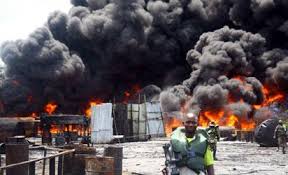
By Adekunle Adekoya
Almost every day, we get reports that “illegal refineries have been destroyed in one part of the labyrinthine Niger Delta creeks or the other.
On August 10, at the opening ceremony of the second Commandant-General’s Conference for the year 2023, the Nigeria Security and Civil Defence Corps, NSCDC, disclosed that it had destroyed over 100 illegal refineries across the country in the last two years, according to its Commandant-General, Dr. Ahmed Audi. In addition Audi disclosed that his organisation has “arrested over 200 suspects involved in vandalism in the last two years”.

Earlier on June 1, the Defence Headquarters revealed that troops of Operation Delta Safe, OPDS, have similarly destroyed 47 illegal refining sites and apprehended 65 suspected oil thieves and other criminals in the last two weeks. This disclosure was made by the Director of Defence Media Operations, Major-General Musa Danmadami.
General Danmadami said the troops had sustained the tempo in the war against oil theft, illegal refineries and other criminal activities through aggressive raids, patrol and clearance operations, etc.
Danmadami further disclosed that troops recovered 186,000 litres of crude oil, 42,750 litres of Automotive Gas Oil, 4,500 litres of Premium Motor Spirit and 200 litres of Dual Purpose Kerosine.

The spokesperson said 250 storage tanks, 220 ovens, 32 dugout pits, 31 wooden boats, one gas welding cylinder, and one pocking gas were recovered.
It worries me to no end that despite the repeated raids on these illegal refining sites, they somehow find ways to resume business. That means the business is so lucrative that confrontations with security operatives have become an ineffective deterrent. If that is not worrisome enough, one must consider the impact on the environment of the destruction of such refining sites, usually done by setting them on fire. Just imagine the pollution unleashed into the environment by the fumes coming from the fires set to the refining sites. Much of the oil and residues from the fire will percolate into the soil and further degrade the quality of the fauna and flora of the wetland ecosystem of those areas.
Because these “illegal refiners” spring back into business almost immediately after an attack, I think it is time that the Nigerian state took another look at them, and fashion a policy that will constructively engage them. I am peeved that no legislator from the Niger Delta, be it in the Senate, House of Representatives and the state Houses of Assembly of states of the Niger Delta have thought it worth their while to prod the Federal Government in this direction.
With our preferences firmly fixed on things foreign and imported, it is not surprising that government is not looking at how to enhance the local capabilities of our “illegal refineries”. But I think the time is nigh that we do that. Federal agencies like NASENI (National Agency for Science and Engineering Infrastructure), and FIIRO (Federal Institute of Industrial Research, Oshodi), in Lagos should conduct studies on these “illegal refineries” if they have not, audit their technologies, however crude they may be, and see how we can formalise and improve them through an industrial process so that the nation’s refining capacity can be boosted. If we can do these, illegal crude drilling would stop, and the peoples of the Niger Delta in this illegal run would come within the orbit of formalised operations. It will be a win-win situation for Nigeria and Nigerians. We cannot continue throwing the baby away with the bath water. Burning illegal refining sites destroys the equipment they have installed, and impacts the environment negatively.
I am convinced that this is a way out for the government which finds itself trapped in a cul-de-sac where it cannot refine crude locally and does not want to continue paying subsidy on imported refined products. In any case, it is on record that the defunct Republic of Biafra was able to generate its need for petroleum products through the use of local refining technology. What is so bad in dusting the archives and exhuming that technology? Also, we have enormous coal deposits. South Africa is a country that is known for its technology through which it gets petroleum products from coal. We can borrow the technology, can’t we? If the legal refineries can’t help us, perhaps there is a way out with the illegal ones. Let’s look hard and well.
In any case, if our leaders think the way China’s leaders think, these “illegal refineries” will not be objects of destruction. They would have created an industry out of them and would be earning foreign exchange. Our men of money are finding it herculean to build refineries using modern Western technology; we are still waiting for the Dangote Refinery to take us out of the petrol subsidy choke-hold and we don’t know for how long. Government should revisit the “illegal refineries” and see how they can be our way out, instead of empowering security agencies to just destroy them. My two-kobo today. Are decision-makers reading? TGIF!




GIPHY App Key not set. Please check settings